

Timmon"s Model of the Entrepreneurial Process - Innovation Ventures ~ fostering entrepreneurship. Demystifying Entrepreneurship (Source: New Venture Creation by Jeffrey Timmons and Stephen Spinelli, Jr at the Banson College, Center for Entrepreneurship) Entrepreneurship is a way of thinking, reasoning, and acting that is opportunity obsessed, holistic in approach and leadership balanced.
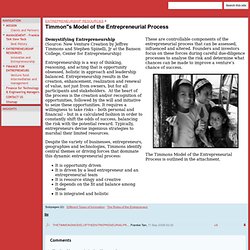
Entrepreneurship results in the creation, enhancement, realization and renewal of value, not just from owners, but for all participants and stakeholders. At the heart of the process is the creation and/or recognition of opportunities, followed by the will and initiative to seize these opportunities. It requires a willingness to take risks – both personal and financial – but in a calculated fashion in order to constantly shift the odds of success, balancing the risk with the potential reward. Entrepreneurship. Entrepreneurship is the process of starting a business or other organization.
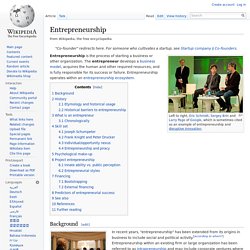
The entrepreneur develops a business model, acquires the human and other required resources, and is fully responsible for its success or failure. Entrepreneurship operates within an entrepreneurship ecosystem. Background[edit] In 2012, Ambassador-at-Large for Global Women's Issues Melanne Verveer greeted participants in an African Women's Entrepreneurship Program at the State Department in Washington, D.C. In recent years, "entrepreneurship" has been extended from its origins in business to include social and political activity. Entrepreneurial process - a framework - The Duke Entrepreneurship Manual: A Resource for Entrepreneurs. Although it is natural to think of the early steps as occurring sequentially, they are actually proceeding in parallel.
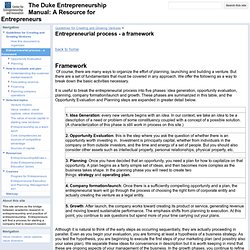
Even as you begin your evaluation, you are forming at least a hypothesis of a business strategy. As you test the hypothesis, you are beginning to execute the first steps of your marketing plan (and possibly also your sales plan). We separate these ideas for convenience in description but it is worth keeping in mind that these are ongoing aspects of your management of the business. In the growth phases, you continue to refine you basic idea, re-evaluate the opportunity and revise your plan. This website is focussed on the early phases of new ventures. The focus here is the evaluation and planning phases.
To take this analysis one level deeper, we can break down each of these phases as follows. Opportunity Evaluation. The Life Cycle of An Entrepreneur - Neil Asher. Neil Asher - Lifecycle of an entrepreneur If you are or ever have been a work from home entrepreneur, you can probably relate to this… These are the 4 Stages of the work from home entrepreneur Life Cycle, according to ME.
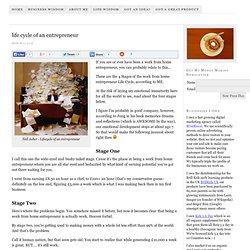
At the risk of laying my emotional immaturity bare for all the world to see, read about the four stages below. I figure I’m probably in good company, however, according to Jung in his book memories dreams and reflections (which is AWESOME by the way), our emotional development stops at about age 7. So that would make the following juuuust about right then Stage One I call this one the wide-eyed and bushy tailed stage. I went from earning £8.50 an hour as a chef, to £100+ an hour (that’s my conservative guess–definitely on the low end, figuring £5,000 a week which is what I was making back then in my first business. Stage Two Here’s where the problems begin. By stage two, you’re getting used to making money with a whole lot less effort than 99% of the world. Stage Three. The VC-Entrepreneur Lifecycle. The Life Cycle of Entrepreneurial Ventures. The Life Cycle of Entrepreneurial Ventures discusses topical issues in entrepreneurship organized around the various stages of venture creation, development and performance.
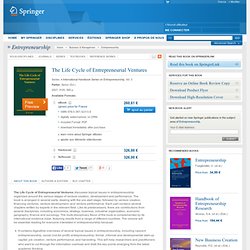
The book is arranged in several parts, dealing with the pre-start stage, followed by venture creation, financing ventures, venture development, and venture performance. Each part contains several chapters written by experts in the relevant field. Like its predecessors, there are contributions from several disciplines, including economics, strategy, business, industrial organization, economic geography, finance and sociology. The multi-disciplinary flavor of the book is complemented by its international evidence base, featuring results from a range of different countries. The volume will be essential reading for everyone interested in entrepreneurship because: Content Level » Research Related subjects » Business & Management - Entrepreneurship - Industrial Organization Table of contents / Preface / Sample pages.
Www.wamda.com/web/uploads/resources/Critical-Phases-of-Mentoring-2011.pdf. Cws.cengage.co.uk/stokeswilsonmador/Erratum CH6 lowres.pdf. How does the venture capital industry work? « Global Entrepreneurship Institute. Discussions About The Venture Capital Industry Marc Andreessen, co-founder of Netscape, vividly describes an insider’s view to the venture capital industry’s food chain: The best venture capitalists (VCs) can see ahead and are willing to think they can fix things, put the management team together, do all this stuff.
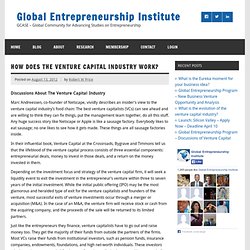
Any huge success story like Netscape or Apple is like a sausage factory. Everybody likes to eat sausage; no one likes to see how it gets made. These things are all sausage factories inside. Entrepreneurial Life Cycle « Global Entrepreneurship Institute.